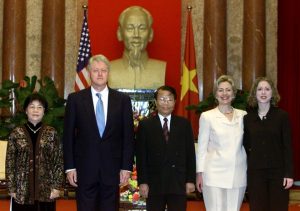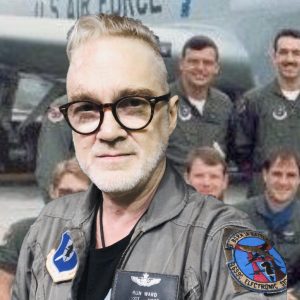
Introduction
At the end of 2000, US President Bill Clinton visited Vietnam, opening the door to friendly relations between the two former enemies Vietnam and the United States.
President Bill Clinton gave a wonderful speech at the reception of President Tran Duc Luong on the evening of November 17, 2020 in Hanoi.
Daivietnam.com would like to republish the full text of this speech, in Vietnamese, and the original English text.
Mr. President, Madam Luong, distinguished representatives of the Vietnamese government, ladies and gentlemen: Let me thank you for your welcome to me and to my family and to our entire American delegation.
We are honored to join you in writing a new chapter in the relationship between the United States and Vietnam, and grateful that this chapter has a happy beginning. Yes, the history we leave behind is painful and hard.
We must not forget it, but we must not be controlled by it. The past is only what precedes the future, not what determines it.
America and Vietnam are making a new history today. A generation from now, people will look back on this time and see the American veterans who came back to Vietnam searching for answers about the past, and the Vietnamese who enlisted them in building a common future.
They will see the young Vietnamese students, eager to absorb all the world has to offer, and the young Americans who have come here to learn with them. They will see the entrepreneurs and the scientists and the conservationists and the artists, forging links between Vietnam and the world.
In short, people will look back and reach the same conclusion as the great Vietnamese statesman, Nguyen Trai, when he said 500 years ago, “After so many years of war, only life remains.”
Today, our people face a changing world and a changing life together, with the same basic aspirations and even some of the same worries. How can we seize the opportunities of a global economy while avoiding its turmoil? How can we open our doors to new ideas while protecting our traditions, our cultures, our way of life?
Globalization is bringing the world to Vietnam and also bringing Vietnam to the world. Films about life in Vietnam, from “The Scent of the Green Papaya” to “The Three Seasons” are winning awards all over the globe. The paintings of the Vietnamese artist, Do Quang Em, command fortunes at international art shows. The 200-year-old poems of Ho Xuan Huong are published in America — in English, in Vietnamese, and even in the original Nam, the first time ancient Vietnamese script has come off a printing press.
Fashion designers like Armani and Calvin Klein base new collections on the traditional Vietnamese dress, the Ao Dai. Americans are tasting lemon grass, garlic chives and even bitter melon, all of which, by the way, grow on a Vietnamese farm in our state of Virginia, just a 20-minute drive from the White House.
Mr. President, globalization also means that on the Internet, Americans can read the latest Vietnamese financial news, or learn about the challenges in restoring Hanoi’s Old Quarter, or support the organizations working to preserve new species being found in the central highlands.
It means we can download fonts in the Vietnamese language. Indeed, before long, sophisticated translation technologies will make the Internet a force for linguistic diversity, not uniformity.
When we open our doors, we not only let new ideas in, we let the talent and creativity and potential of our people out. That, too, will come to Vietnam. After just one day in your country, I am certain there will be no stopping the people of Vietnam as they gain the chance to realize their full potential. The people of the United States are happy that the time has come when we can be partners.
As the tale of Kieu foretold,
“Just as the lotus wilts,
the mums bloom forth;
time softens grief,
and the winter turns to spring.”
Now the frozen images of the past have begun to thaw. The outlines of a warmer shared future have begun to take shape. Let us make the most of this new spring together.
I ask you to join me in a toast to the President of Vietnam, to Madam Luong, to the people of this great country and to our future friendship together. (Applause.)
About the Vietnamese interpreter – American – for US President Bill Clinton in 2000 in Hanoi

(According to vnexspress-2000)
In November 2000, when President Clinton was about to visit Vietnam, Mr. Ron Ward was a soldier in charge of interpretation, analysis and investigation at the Office in charge of MIA issues (missing American soldiers) in Hanoi.
This is the first time an American president has come to Vietnam, 25 years after the war ended. According to the plan, Mr. Clinton will visit the excavation site of a US plane shot down in 1967 in Me Linh district, Vinh Phuc province, about more than an hour’s drive from Hanoi.
“Within a month before the visit, my colleagues and I had to go to the scene with White House staff to prepare security and logistics. Through that, they knew that there was an American – a me- can speak Vietnamese and this advance team of the White House remembers that,” Mr. Ron said.
When coming to Vietnam, President Clinton brought with him an interpreter who was of Vietnamese origin and was elderly.
While President Clinton was speaking at Hanoi University, this interpreter had problems and stopped working, forcing the students to listen entirely in English.
That evening, the US President also had a meeting on post-war mine removal at the International Convention Center in Hanoi.
So President Clinton’s assistants rushed to find a translator to replace the malfunctioning interpreter.
Unexpected order
While Mr. Ron was eating with his superiors, two US military officials, at a restaurant in Hanoi, Mr. Ron received a phone call from a representative of the White House, informing him that he had been appointed to translate for President Clinton at the above meeting.
“The general, my big boss, said: ‘OK, you wear a suit,'” Ron said. “About 45 minutes later I had to be there without any preparation. Two people tried to translate but couldn’t, and the White House knew that there was an American who knew Vietnamese, which was me.”
Mr. Ron immediately went to the Convention Center. He was assigned the task “Translate whatever the President says”.
Mr. Clinton spoke about the US and Vietnam’s cooperation to resolve post-war landmine consequences in localities.
“Fortunately, I was already working in the military, so all the words he said were familiar to me. I translated for about 20 minutes. Everything went completely smoothly. The President thanked me.” Ron said.
When Clinton went to Noi Bai airport to return to the United States, Mr. Ron put on his military uniform and continued to act as a translator for the President, his wife Hillary Clinton and their daughter, Chelsea.
“After parting ways with Vietnamese officials, President Clinton met me and said: “Ah! You is a translator. “You was the interpreter who helped me,” Ron recounted the moment of conversation with the US president.
I replied: “Yes, sir, I am the person who was your translator earlier.”
The President asked: “Where did you learn Vietnamese?”
I replied: “I studied Vietnamese at the Institute of Linguistics of the Ministry of Defense, in the US.”
Hillary also said: “Oh, thank you. You are very skilled.”
Ron Ward learned Vietnamese in the 1980s in the US, and when he was sent to work in Vietnam in 1992, he spent 10 years learning this language.
He is a Casualty Treatment specialist, division 2 (DET 2), of the US Joint POW and Missing Command (JPAC). Ron was one of the architects of the program to search for prisoners of war and Americans missing in action (POW/MIA) in Vietnam.
To date, Ron Ward has had 23 years of working with this humanitarian work in Vietnam.
His relationship with Vietnam became even more complete when he married a Vietnamese woman and had two children.///

